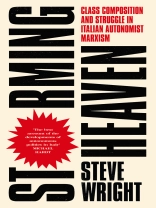Storming Heaven is the only book which looks at Italian workerist theory and practice, from its origins in the anti-Stalinist left of the 1950s to its heyday twenty years later. It focuses on the theme of workerism, or ‘operaismo’, which includes the refusal of work, class self-organisation, mass illegality and the extension of revolutionary agency, of of which are still practiced today by workers across the world.
Emphasising the dynamic nature of class struggle as the distinguishing feature of workerist thought, Storming Heaven reveals how this form of radical politics developed alongside emerging social movements to great effect. It assesses the strengths and limitations of workerism as first developed by Antonio Negri, Mario Tronti, Sergio Bologna and others.
This edition includes a new chapter looking at the debates around operaismo and Autonomia since the book originally appeared in 2002, and is updated with a new foreword and afterword.
Tabela de Conteúdo
Foreword by Harry Cleaver
Acknowledgements
Introduction
1. Weathering the 1950s
2. Quaderni Rossi and the Workers’ Enquiry
3. Classe Operaia
4. New Subjects
5. The Creeping May
6. Potere Operaio
7. Toni Negri and the Operaio Sociale
8. The Historiography of the Mass Worker
9. The Collapse of Workerism
10. Conclusion
Postscript: Once More, With Feeling: A Bibliographic Essay
Afterword to the Italian Edition by Riccardo Bellofiore & Massimiliano Tomba
Bibliography
Index
Sobre o autor
Massimiliano Tomba is in the Department of Political and Juridical Sciences and International Studies at the University of Padova. He is the author of Marx’s Temporalities (Haymarket, 2014).












